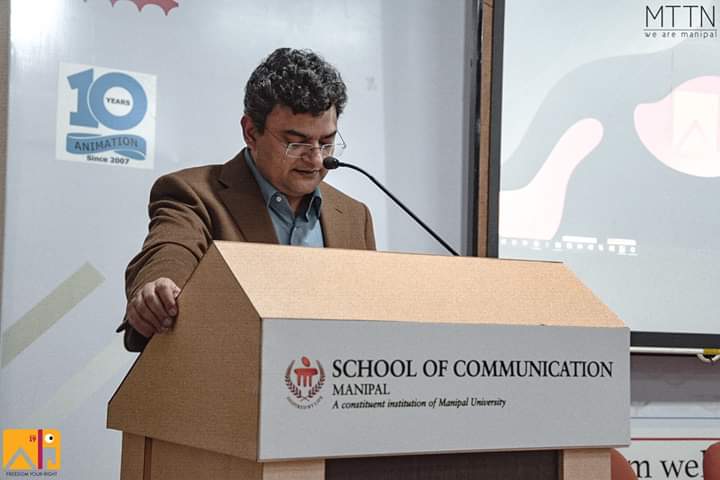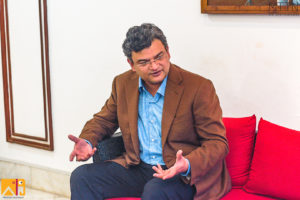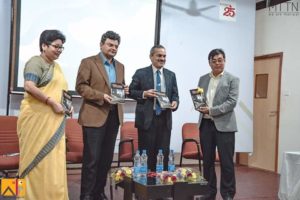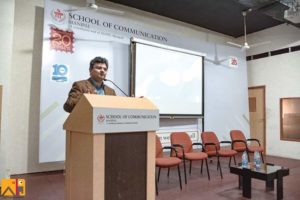
Article-19, Manipal School of Communication’s media event started off with a bang, with the first speaker of their highly prestigious line-up – Dr Anand Ranganathan. A vehement advocate of the freedom of expression, Ranganathan gave a refreshing insight into what journalism is today. He explained why we need to be scientific about our journalism, and emphasized the pursuit of knowledge and facts, and basing our opinions on this gained knowledge. How this knowledge can have a place in this world, only if we have the freedom to say it out loud.
In his interview with us, prior to his talk at the fest, Anand Ranganathan talked to us about issues that matter to us, as future citizens of an increasingly divided country. Our questions about the Indian polity, science, and some of his earlier articles were answered with opinions that were backed by facts; and those facts, by their sources. Here is an excerpt of the conversation Mr.Ranganathan had with us at MTTN.

MTTN: While your first article on the demonetisation series spoke volumes about the PM’s inability to foresee the turmoil that followed after he demonetised the Rs. 500 and Rs. 1000 banknotes, you also briefly touched upon how Indira Gandhi’s decision of nationalising the banks was a horrendous decision too. It is a well-stated fact that it has indeed nationalised corruption (notably the Harshad Mehta Scam) but the existence of these organisations after all these years is also because of nationalisation. Do you think the banking sector, in terms of the number of banks, would have been stable had they not been nationalised?
Anand: Yes, I’m totally against the nationalisation of banks, and against the Government being involved in business. I think that is the biggest corruption scandal that has happened and no one thinks of it as corruption. Yes, I do believe that under private hands, these banks may dissolve, in a healthy competition. But on the other hand, they might excel too. This is where the Government is wrong, you can’t go against the aspects of Darwin’s Theory of Evolution. You have to survive the competition. These whimsical decisions of nationalising the banks have devastated the banking sector. A prime example is the Non-Performing Assets (NPAs), where private banks have performed better than these nationalised banks because the latter would always get huge monetary infusions to counter the NPA losses because their job is not on the line. Banks should never be nationalised.
MTTN: Twitter had censored and withheld tweets posted by you and filmmaker Vivek Agnihotri. This case also highlighted the tweets by right-wing accounts like yours facing ban and scrutiny for not agreeing with the left-leaning bias of Twitter, something which the CEO Jack Dorsey admitted in an interview to CNN. Do you think Twitter, being a hot platform for political commentary, still remains unbiased in terms of its content?
Anand: These things are very difficult to decipher but yes, there is a bias, a left-bias in Twitter; an establishment bias towards an ecosystem cropped up by the Congress. I was able to prove this a couple of years ago using a very simple experiment. Twitter changed the ways through which they were able to verify accounts (by adding the blue ticks). Anyone could verify Twitter accounts, left and pro-Congress people who had 20-50 followers had their accounts verified but the non-left people, including leading journalists like Chitra Subramanium, Sucheta Dalal, none of them were verified. But the point is, a sad one, that the political bias affects the app because you can ban and remove people from it.
MTTN: You have written an eye-opening and informative article on the secularism debate. Most people are aware of the fact that it is the BJP, in recent years, who are undermining the secular nature of the Constitution. But what the opposition has advocated is somewhat of a misrepresented definition of secularism. Do you think the history being taught in schools is heavily influenced by the political gain of those in power?
Anand: Absolutely. This practice has been prevalent during the Congress rule, and it still carries on during the BJP regime, but the only difference being that the BJP is not very clever about it. They will add their own selectivity to history, which would make people believe some people to be their heroes, but the facts say otherwise. Take Veer Savarkar, for example. He was a freedom fighter, and I respect that, but the facts also said that he did sign those mercy petitions which said that his release would restore the faith of youth in the British rule. Maybe this is still justifiable considering that he spent a decade in solitary refinement, but the facts also say that he was acquitted for the assassination of Mahatma Gandhi. The BJP needs to come forward and say the truth, and let the people decide.
MTTN: You recently appealed to more funding and grants given to colleges and universities for research and innovation. A way of increasing this has been by allowing private companies to fund research. While following this American model of funding would attract more students and scientists towards research, subconsciously it does create some sort of influence by the ones who granted the research. Do you believe the idea of personal gain and ownership of scientific breakthroughs in India is not something far-fetched if research projects are funded privately?
Anand: I do believe in the Government being involved, monetary and otherwise, in health and education. It includes science, at least for the foreseeable future. You may call me a hypocrite for saying on one hand that I don’t want any government interference but on the other hand I do want Government’s involvement. The point here is that we are not at that stage where private organisations can just come and get involved in these sectors. This was spectacularly shown in the 1990s, where there were no regulations on who can open a university. There was a single-room facility in Chattisgarh and it was deemed as a university. Of course, there are some good private players, but we are still not at that level where private players could contribute majorly to health, education and science. There is also a huge conflict of interest among private entities who can sneak around, and make the Government devise policies to benefit them. The current situation is dangerous, but it is improving.

In his twenty-minute-long address, which was followed by a round of questions from the audience, Ranganathan spoke of the media and the extreme polarity of our society today to an audience of budding journalists. He stressed on being objective – how science is a philosophy that needs to be infused into our media, primarily because of its objectivity. In a world where media houses discretely take sides on the political spectrum, he emphasized how important it is for us to do our own research and make our opinions, based on not our political opinions, but simply on facts. Stressing on how it is vital that we as a democracy never stop questioning, Anand asked students as citizens to go and seek the truth and make observations neutrally to understand the entire picture.

Questions that were asked by the students revolved around his articles, his views and his profession – how he manages to write as well as make significant breakthroughs in his professional field of molecular chemistry. The session ended with a thunderous round of applause. Most of the audience was in sheer awe of the man before them, due to the clarity of his thoughts, and the courage with which he spoke.
Anand Ranganathan currently serves as a Consulting Editor at the Swarajya magazine. A scientist by profession, he has previously written for the News Laundry and The News Minute. He is a strong commentator on Indian politics and has written articles on the current BJP administration led by Narendra Modi. An associate professor at the Jawaharlal Nehru University, Delhi, his laboratory works on malaria and tuberculosis. He has also authored several books on the Indian polity.
Written by Rishi Kant and Siri Rajanahally for MTTN
Photography by Dhruv Pandey
Leave a Reply
You must be logged in to post a comment.